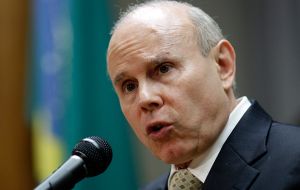MercoPress. South Atlantic News Agency
Brazil announces 12bn dollars direct aid for state and city governments
 “We need to change the path of economy policy”, said Mantega
“We need to change the path of economy policy”, said Mantega Anticipating further global market turmoil and ahead of October municipal elections, the Brazilian government will be announcing measures to prod the economy with direct support for states, cities and reversing corporate tax hikes, involving at least 25 billion Reais equivalent to 12 billion dollars.
Finance Minister Guido Mantega said the government has decided to lend up to 10 billion Reais (4.8 billion dollars) to states and may reverse a recent tax hike on corporate loan transactions overseas.
In an interview on Wednesday with O’Globo, Mantega said the emergency credit line, which will be financed by state development bank BNDES, will be presented to the nation's 27 state governors at a ceremony in Brasilia this Friday.
The newspaper also said that the credit line is part of a package to prevent economic growth this year from slowing further. Last year, Latin America's largest economy expanded 2.7% and there are risks that growth this year comes below that number, Globo said.
Mantega told the paper that the government acknowledges the necessity to “change the path of economic policy and combine fiscal adjustment policies with different types of stimulus” to combat a financial crisis stemming from the worsening of the Euro zone debt crisis.
Beset by fallout from the global downturn, which has sapped demand for commodity exports and discouraged investment by local business and industry, Brazil is struggling to revive an economic boom that led to annual growth of 7.5% in 2010, the strongest showing of growth in a quarter century. The economy expanded 0.2% in the first quarter on a sequential basis.
If the crisis aggravates further, the government might consider eliminating some of the measures it adopted more than a year ago, when the nation's currency was gaining ground against the US dollar, Mantega told Globo.
“The first in the list” of those measures to be reversed would be a surcharge on the so-called IOF tax on loans of up to five years obtained by local companies overseas, Mantega told the newspaper.
“Some of those measures could be revisited at their very moment,” Mantega said. “The hike in the IOF tax for loans ... is a very rigorous one”.
In a similar announcement Cities minister Aguinaldo Ribeiro said that the government will announce a program of 15 billion Reais (7.2 billion dollars) in urban sanitation and road investments in coming weeks.
The investment plan will direct 5 billion Reais toward paving roads and 10 billion Reais toward basic sanitation as Brazil approaches municipal elections in October and President Dilma Rousseff tries to revive economic growth, which helped sweep her into office.
The funds originating from the Treasury will come on top of the 50 billion Reais the government has already earmarked in so-called economic acceleration packages aimed at infrastructure in preparation for the 2014 World Cup and 2016 Rio Olympics.
Finally Energy minister Edison Lobao announced that there is no chance of Brazil raising domestic fuel prices this year, “given the recent drop in international crude prices”.
This in spite the fact the gap between global fuel prices and government-controlled prices in the Brazilian market has led to losses at the refining division of state-led oil company Petrobras.
The pending midterm municipal elections will be viewed by analysts as a referendum on the Rousseff government, which is now 18 months into its first four-year term.




Top Comments
Disclaimer & comment rulesCommenting for this story is now closed.
If you have a Facebook account, become a fan and comment on our Facebook Page!